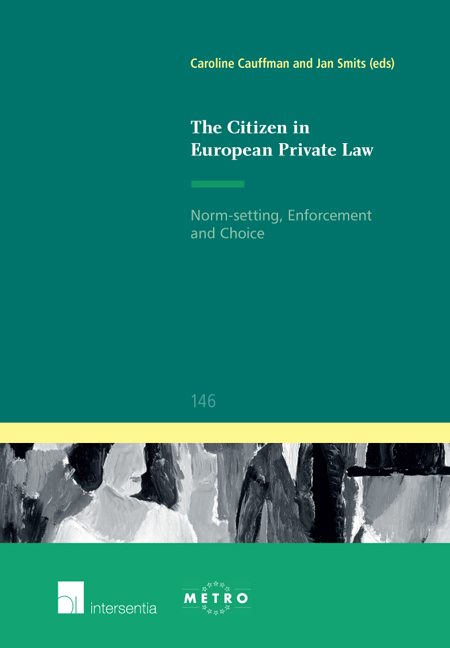Book contents
- Frontmatter
- Contents
- List of Authors
- List of Abbreviations
- Preface
- Introduction
- Part I Choice and Regulatory Competition
- Part II Norm-Setting and Enforcement
- Private Actors as Norm-Setters through Choice-of-Law: The Limits of Regulatory Competition
- Private Norm-Setting in Family Law, More Specifically: Private Norm-setting amongst Religious Communities in Family Law Issues
- Enchained Marriages: Is there a Way out?
- An Introduction to Alternative Dispute Resolution (ADR) for Consumers in Europe
- Critical Remarks on the ADR Directive
- Normative Frameworks in Commercial Dispute Resolution: The Role of Legal and Non-legal Norms in Mediation and Adjudication
- Law or Social Ordering: A Choice for Commercial Parties in Dispute Resolution? A Comment on Kornet
- Ius Commune Europaeum
An Introduction to Alternative Dispute Resolution (ADR) for Consumers in Europe
from Part II - Norm-Setting and Enforcement
Published online by Cambridge University Press: 21 September 2018
- Frontmatter
- Contents
- List of Authors
- List of Abbreviations
- Preface
- Introduction
- Part I Choice and Regulatory Competition
- Part II Norm-Setting and Enforcement
- Private Actors as Norm-Setters through Choice-of-Law: The Limits of Regulatory Competition
- Private Norm-Setting in Family Law, More Specifically: Private Norm-setting amongst Religious Communities in Family Law Issues
- Enchained Marriages: Is there a Way out?
- An Introduction to Alternative Dispute Resolution (ADR) for Consumers in Europe
- Critical Remarks on the ADR Directive
- Normative Frameworks in Commercial Dispute Resolution: The Role of Legal and Non-legal Norms in Mediation and Adjudication
- Law or Social Ordering: A Choice for Commercial Parties in Dispute Resolution? A Comment on Kornet
- Ius Commune Europaeum
Summary
This chapter discusses alternative dispute resolution for consumers in Europe. It is based on a presentation first given at ‘The Citizen in European Private Law: Normsetting, Enforcement and Choice’ at Maastricht University, 18 October 2013.
Civil justice landscapes are shifting and changing. The courts – in most European Union (EU) member states known to be difficult to access – take a long time to process cases, are costly, and do not provide for appropriate access to justice for low-value consumer to business disputes. This chapter provides a snapshot overview of consumer ADR in Europe and is divided into the following parts: an overview of ADR and EU legislation; the vision for consumer ADR; courts and ADR; some national examples; and finally, a view to what happens next.
What ADR are We Talking about?
First of all it is important to clarify what kind of ADR this paper is talking about. ADR is not well known outside of litigation, and is fairly new in many EU jurisdictions. This means that there is a distinct ‘ADR universe’ that is developing alongside the national court systems. Alternative dispute resolution typically describes a multitude of techniques (arbitration, conciliation, mediation, and settlement, for example) that aim to assist in reaching an outcome for a dispute without involving a court. There are numerous approaches and techniques within ADR; this chapter is concerned with ADR for consumer disputes. Consumer ADR is typically aimed at small value complaints about goods and services that would usually not make it into a courtroom.
There are different types of ADR, and models often differ between countries. The most common examples are ombudsmen, conciliation bodies, no fault compensation schemes, dispute resolution boards, and dispute resolution systems as part of business codes of practice. All of these models are made up of a mixture of the techniques mentioned above. In our 2012 book on consumer ADR in Europe there is more detail on procedure and various ADR techniques.
The current ADR landscape in the EU is varied and inconsistent. With the outlook to improve access to justice and encourage consumer confidence in the European single market, European legislation on consumer ADR and online dispute resolution (ODR) was passed in 2013 and had to be implemented by July 2015; the ODR regulation by early 2016.
- Type
- Chapter
- Information
- The Citizen in European Private LawNorm-Setting, Enforcement and Choice, pp. 141 - 154Publisher: IntersentiaPrint publication year: 2016

